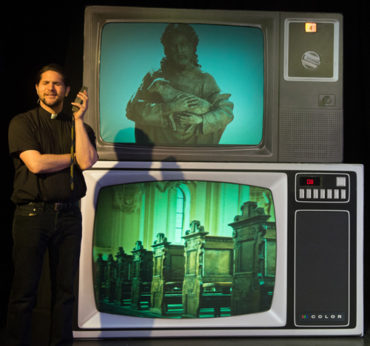
LOS ANGELES—“Here we have two immigrants trying to figure out how to become ‘American’ and what that means,” says Debbie Devine, director of the world premiere production of Leon Martell’s play ICE, now on stage at the award-wining 24th Street Theatre.
“Does it mean economic success and getting ahead?” she asks. “Does it mean fairness and justice and democracy? How is America marketed? Perception becomes reality.”
Chepe (Jesús Castaños-Chima) and Nacho (Tony Durán), cousins and baseball lovers from the Mexican state of Sinaloa, have come to L.A. in 1988, the year their countryman Fernando Valenzuela helps the Dodgers win the World Series. Chepe’s dream is to make it big by creating a world-class “gourmet taco” empire with the little ice cream truck that he has “Mexicanized” by painting over ICE CREAM with TACOS. He recruits Nacho to join him in L.A. for two critical reasons: He needs Nacho’s automotive expertise because the 1971 GMC “troca” is always breaking down, and because he will bring with him Tía Teresa’s famous family salsa recipe made with the “best tomatoes in the world”—from Sinaloa, of course!
“Man plans, God laughs” is how many people look at life: Fate, destiny and circumstance simply take over in the face of all our scripts for the future. What Chepe and Nacho have to accept in the end is that the troca herself has her own character and personality that defy their wishes.
Along the way the two paperless immigrants encounter typical experiences for undocumented workers: Employers who underpay, using the threat of deportation to cheat them out of their fair wages, Americans who demean and harass them, the phone company that cuts off calls before the paid time is up, and the sad realization that America’s “winning is everything” materialism, where generosity is perceived as weakness, leaves little room for human empathy.

A fourth character (I am counting the soulful troca as one) is a blind young Irish Catholic priest (Davitt Felder) seeking to help the poor Mexican-American community in L.A. to which he’s been assigned. He struggles to learn Spanish, he proposes English language classes for his parishioners and finds an immigration lawyer for some of them, but at every turn his monsignor offers only discouragement. While not under siege from ICE, nevertheless the play is also about him and his disillusionment not only with America but with his faith. The playwright treats Father Donnelly admirably, not making his blindness his determinative feature. He shows himself to be a highly capable individual—who, for one thing, just by feel can instantly identify the troca by make and year. Props to Leon Martell for incorporating a positive character with a significant disability.
24th Street Theatre is a small company, but it has strong roots in the community. This is its 20th season, under the rubric “Standing Up and Speaking Up.” The company commissioned Martell to write this play to honor the “brave and noble and hard-working and loving…dedicated and committed and determined” people who have come to this neighborhood between downtown L.A. and the USC campus to “give up everything familiar and embark on a journey full of challenges,” as Artistic Director Debbie Devine and Executive Director Jay McAdams explain in the program.
24th Street Theatre tries to straddle some fine lines in making its points accessible to all audiences, young and old, English- and Spanish-speaking, and in that is it largely successful. In the last play I saw by this company, La razón blindada, the featured performers were also the wondrously capable Jesús Castaños-Chima and Tony Durán playing imprisoned Don Quixote- and Sancho Panza-acting characters. That play was advertised as for teens and adults 14+. ICE is promoted for adults and kids 8+, and the more naïve content is evident.
Younger audiences will especially enjoy Nacho’s juggling with tomatoes (kids, don’t try this at home!), the pantomime baseball plays in the shadow of Dodger Stadium, and the troca’s insistent messaging (done with projections) that guides Chepe and Nacho toward a future neither anticipated. Mature theatergoers will perhaps entertain other questions: Does Mexico need to be so idealized by way of contrast to the U.S.? And does the U.S. have to be such a consistently ugly place? What forces in these two men’s lives propelled them to risk such an uncertain and dangerous life in the States? And, dramatically speaking, why does that kindly priest need to disappear from the story? Not to mention, what made Tía Teresa’s salsa recipe so special? It can’t only have been the Sinaloa tomatoes.
Ideally, I think, children would benefit from having a discussion after seeing the play, either as a school class or in their family. They will have their own questions, some of them possibly very troubling, that deserve to be addressed. Some of them surely would ask what people must sacrifice to achieve success.
For such a modest production, the theatrical elements are well deployed—sound, lighting, video, period props, direction. It’s a bilingual one-acter (with projected translations as needed) at a child-friendly 65 minutes in length. The taco truck is truly a charmer—and naturally, being a truck with a mind all her own, has her own Twitter account: @ICE_Troca!
ICE plays Sat. at 3 and 7:30 pm (both dark May 26), and Sun. at 3 pm (dark May 27). The theatre is located at 1117 W. 24th St., just off the corner of Hoover. There is a small secure parking lot on the southwest corner of 24th and Hoover for $5. For tickets and further information call (213) 745-6516 or go to the theatre website. Note the reduced ticket price for seniors, students and teachers, and a specially low admission for North University Park residents.










